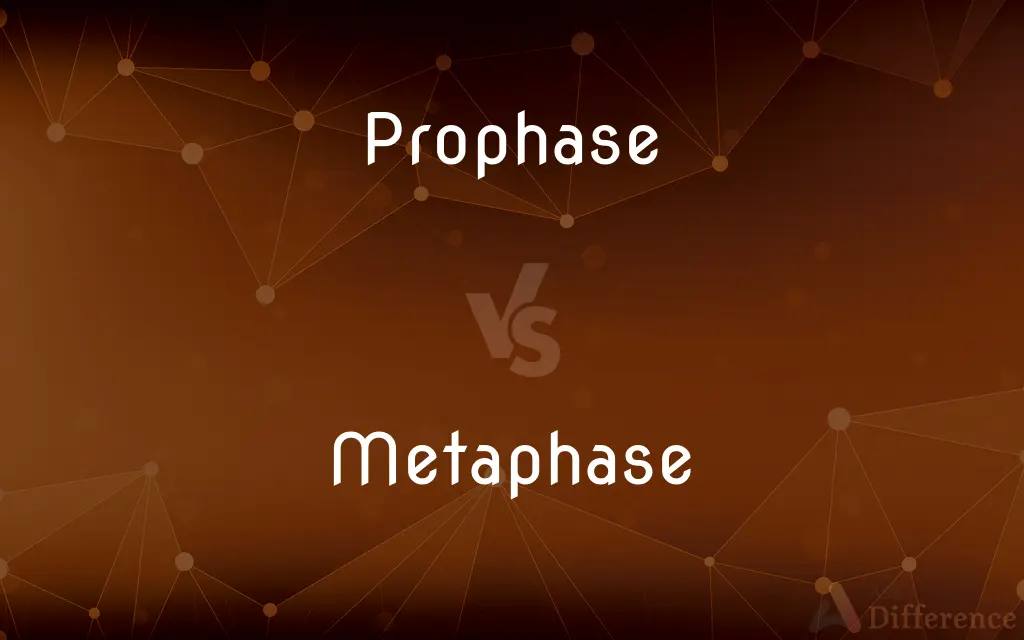Prophase vs. Metaphase — What's the Difference?
Edited by Tayyaba Rehman — By Fiza Rafique — Updated on September 27, 2023
Prophase is the initial phase of mitosis where chromosomes condense, while Metaphase follows with chromosomes aligning at the cell's equator.

Difference Between Prophase and Metaphase
Table of Contents
ADVERTISEMENT
Key Differences
Prophase and Metaphase are both stages in mitosis, the process by which a eukaryotic cell divides its chromosomes between two daughter nuclei. In Prophase, the early phase, the chromatin starts to condense into visible chromosomes, and the nuclear envelope begins to disintegrate. The spindle fibers start to form and attach to the chromosomes during this phase. In contrast, Metaphase is the stage that follows, characterized by the chromosomes aligning at the cell's equatorial plane, known as the metaphase plate.
In Prophase, centrioles move to opposite poles of the cell and begin producing spindle fibers. These fibers are crucial for the later movement of chromosomes. In Metaphase, these spindle fibers pull the chromosomes, ensuring they are centrally aligned, preparing for the next division phase.
Prophase has visible changes like the disappearance of the nucleolus and the breaking down of the nuclear envelope. This sets the stage for the chromosomes to move freely within the cell. However, in Metaphase, the main event is the alignment, ensuring that when cell division occurs, each daughter cell will have a complete set of chromosomes.
While Prophase is more about the preparation and organization of the cell for the ensuing division, Metaphase ensures precision. The alignment during Metaphase is critical to ensure the fidelity of cell division, leading to two genetically identical daughter cells.
Comparison Chart
Stage Order
First phase of mitosis.
Second phase of mitosis.
ADVERTISEMENT
Main Events
Chromosomes condense, spindle fibers form.
Chromosomes align at the metaphase plate.
Cell Structures
Nuclear envelope disappears; nucleolus vanishes.
Spindle fibers fully formed and attached to chromosomes.
Duration
Typically longer than Metaphase.
Shorter, mainly involves alignment.
Significance
Sets the stage for cell division by organizing chromosomes.
Ensures accurate division by aligning chromosomes.
Compare with Definitions
Prophase
The first stage of mitosis where chromatin condenses into chromosomes.
During Prophase, the chromosomes become visible under a microscope.
Metaphase
The phase where spindle fibers attach to the centromeres of chromosomes.
Spindle fibers connect to the chromosomes' centromeres during Metaphase.
Prophase
The phase where the nuclear envelope breaks down.
The disappearance of the nuclear membrane marks the progression of Prophase.
Metaphase
The stage characterized by maximum chromosome condensation.
Chromosomes are most visible in Metaphase due to their heightened condensation.
Prophase
The stage in which spindle fibers start to form.
The spindle apparatus begins its assembly in Prophase.
Metaphase
A short but critical phase ensuring accurate cell division.
Any misalignment during Metaphase can lead to genetic errors in the daughter cells.
Prophase
A phase characterized by the movement of centrioles to cell poles.
In Prophase, the centrioles start their migration, playing a pivotal role in cell division.
Metaphase
The stage of mitosis where chromosomes align at the cell's equatorial plane.
In Metaphase, the chromosomes line up, readying for separation.
Prophase
The mitotic phase where nucleolus disappears.
The vanishing of the nucleolus is a hallmark of Prophase.
Metaphase
The mitotic phase right before the splitting of sister chromatids.
Following Metaphase, the cell proceeds to anaphase, separating the chromosomes.
Prophase
Prophase (from the Greek πρό, "before" and φάσις, "stage") is the first stage of cell division in both mitosis and meiosis. Beginning after interphase, DNA has already been replicated when the cell enters prophase.
Metaphase
Metaphase (from the Greek μετά, "adjacent" and φάσις, "stage") is a stage of mitosis in the eukaryotic cell cycle in which chromosomes are at their second-most condensed and coiled stage (they are at their most condensed in anaphase). These chromosomes, carrying genetic information, align in the equator of the cell before being separated into each of the two daughter cells.
Prophase
The first stage of mitosis, during which the chromosomes condense and become visible, the nuclear membrane breaks down, and the spindle apparatus forms at opposite poles of the cell.
Metaphase
The stage of mitosis and meiosis, following prophase and preceding anaphase, during which the chromosomes are aligned along the metaphase plate.
Prophase
The first stage of meiosis, constituted by a series of events that include the thickening and coiling of the chromosomes, synapsis of homologous chromosomes, tetrad formation, and crossing over.
Metaphase
(biology) The stage of mitosis and meiosis, that follows prophase and comes before anaphase, during which condensed chromosomes become aligned before being separated.
Prophase
The first stage of mitosis, during which chromatin condenses to form the chromosomes.
Metaphase
The second stage of meiosis
Prophase
The first stage of meiosis.
Metaphase
The second stage of mitosis
Prophase
The first stage of meiosis
Prophase
The first stage of mitosis
Common Curiosities
What comes first, Prophase or Metaphase?
Prophase comes before Metaphase.
What is the role of spindle fibers in Prophase?
In Prophase, spindle fibers start to form and attach to chromosomes.
Why is Metaphase crucial for cell division?
Metaphase ensures chromosomes align correctly, ensuring accurate division.
What happens to the chromosomes in Prophase?
In Prophase, chromosomes condense and become visible.
Share Your Discovery

Previous Comparison
Atelectasis vs. Emphysema
Next Comparison
Ingestion vs. InhalationAuthor Spotlight
Written by
Fiza RafiqueFiza Rafique is a skilled content writer at AskDifference.com, where she meticulously refines and enhances written pieces. Drawing from her vast editorial expertise, Fiza ensures clarity, accuracy, and precision in every article. Passionate about language, she continually seeks to elevate the quality of content for readers worldwide.
Edited by
Tayyaba RehmanTayyaba Rehman is a distinguished writer, currently serving as a primary contributor to askdifference.com. As a researcher in semantics and etymology, Tayyaba's passion for the complexity of languages and their distinctions has found a perfect home on the platform. Tayyaba delves into the intricacies of language, distinguishing between commonly confused words and phrases, thereby providing clarity for readers worldwide.
















































